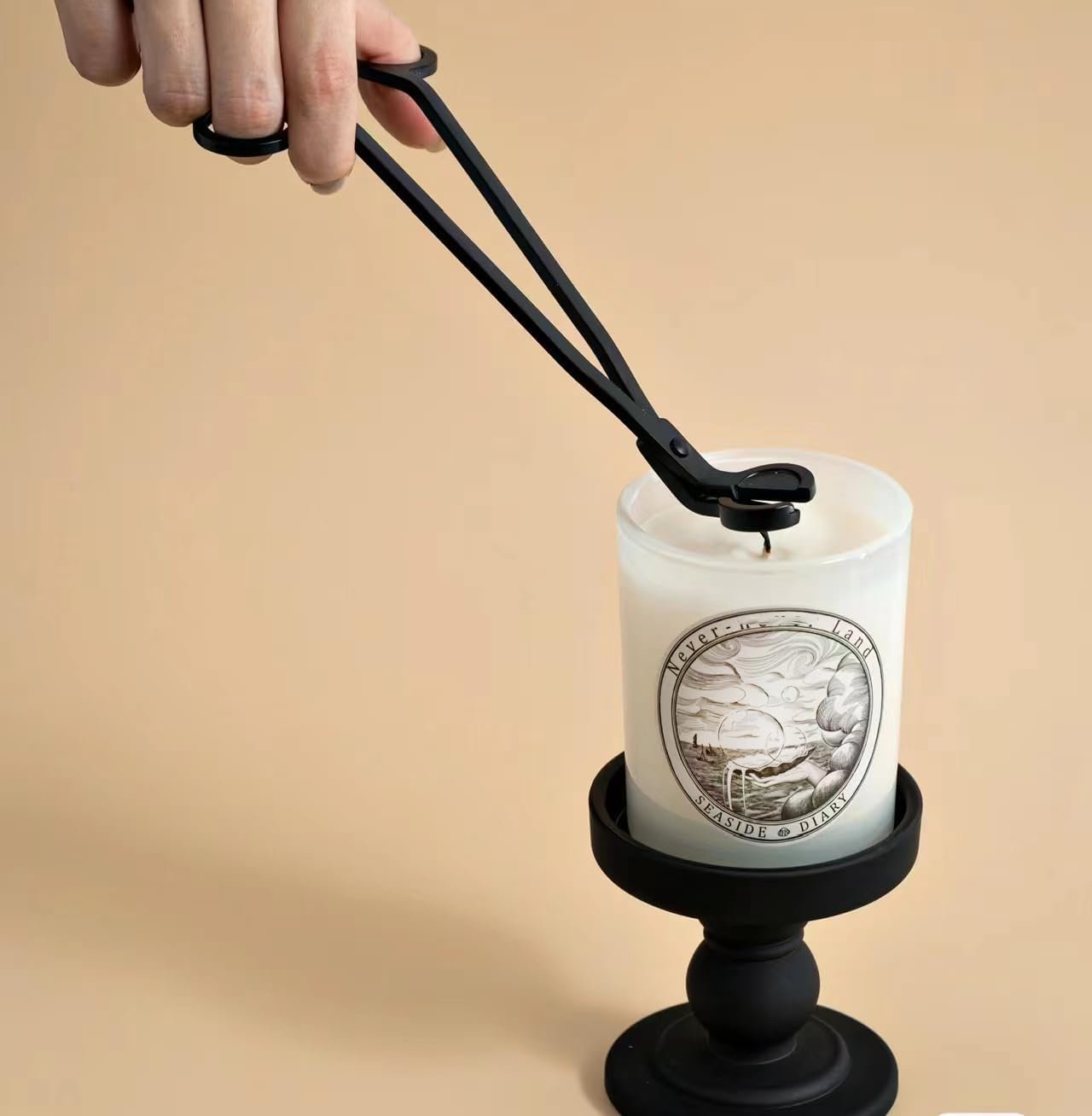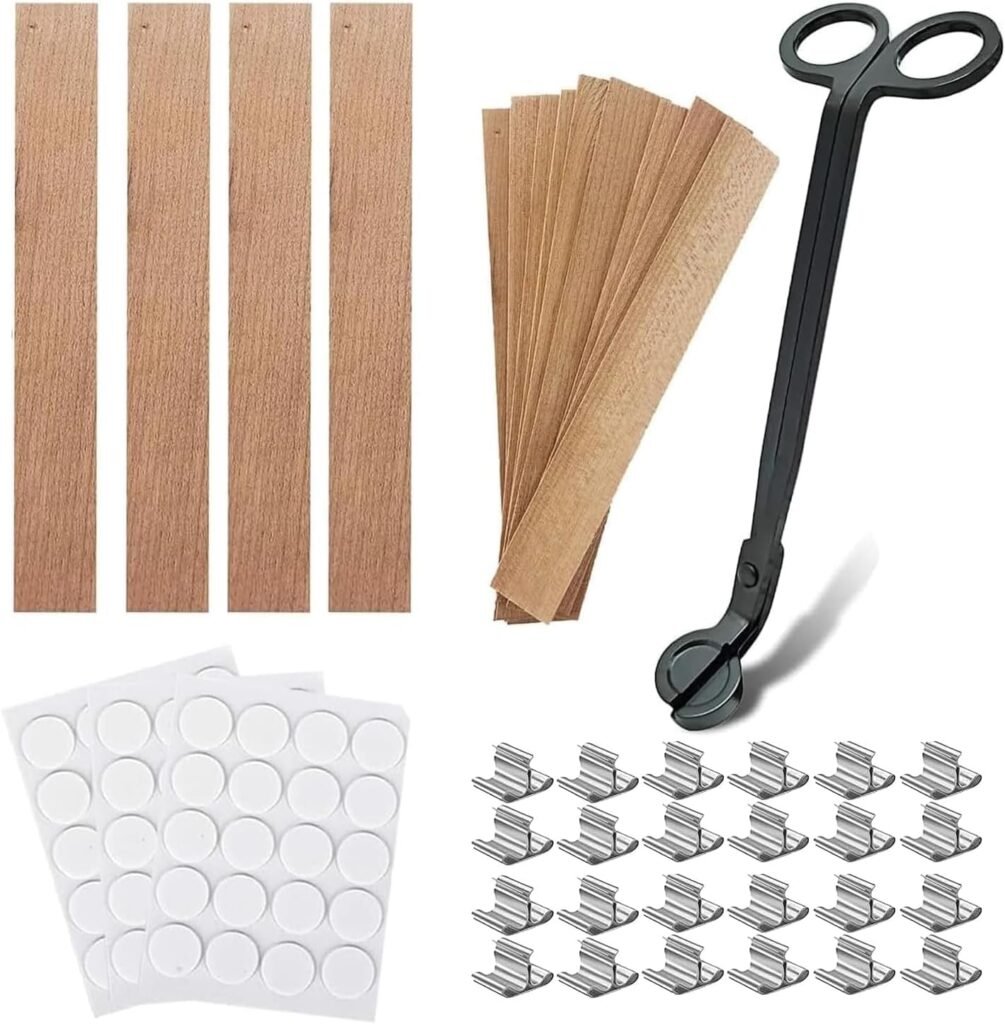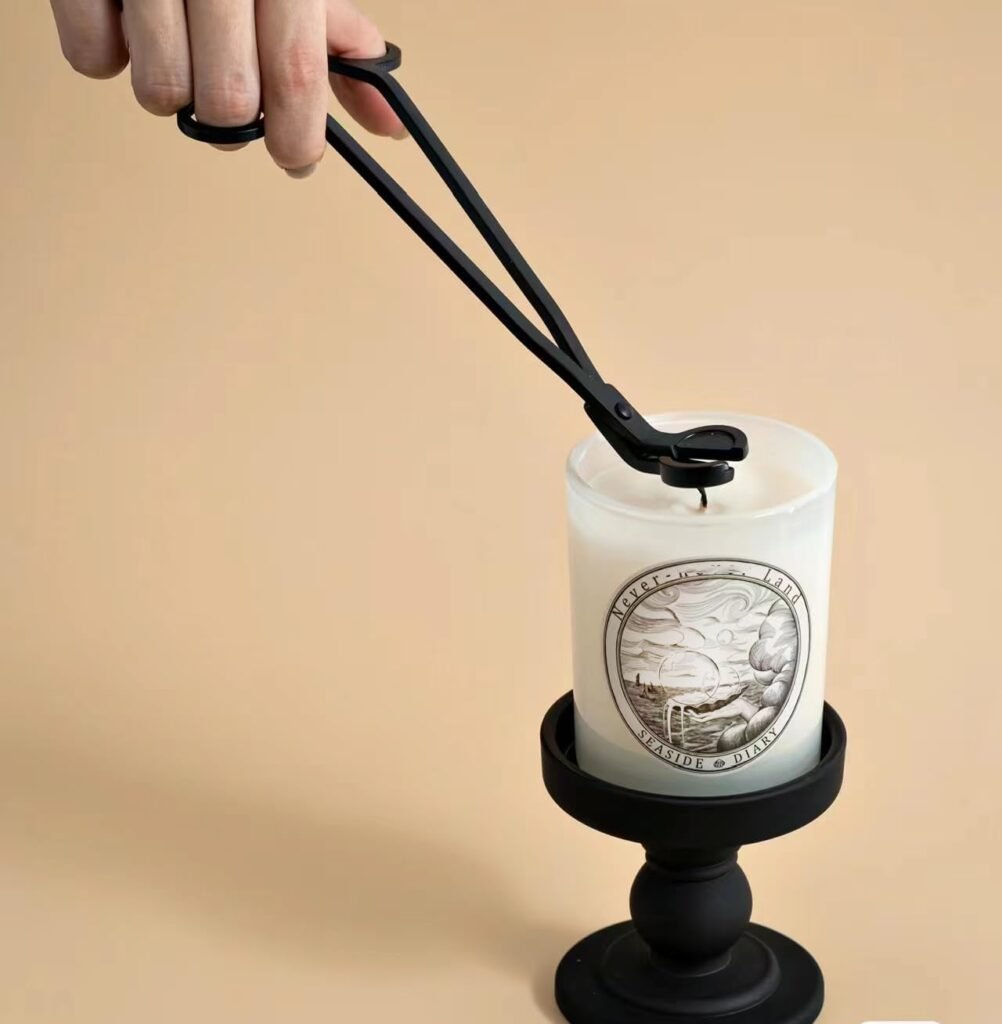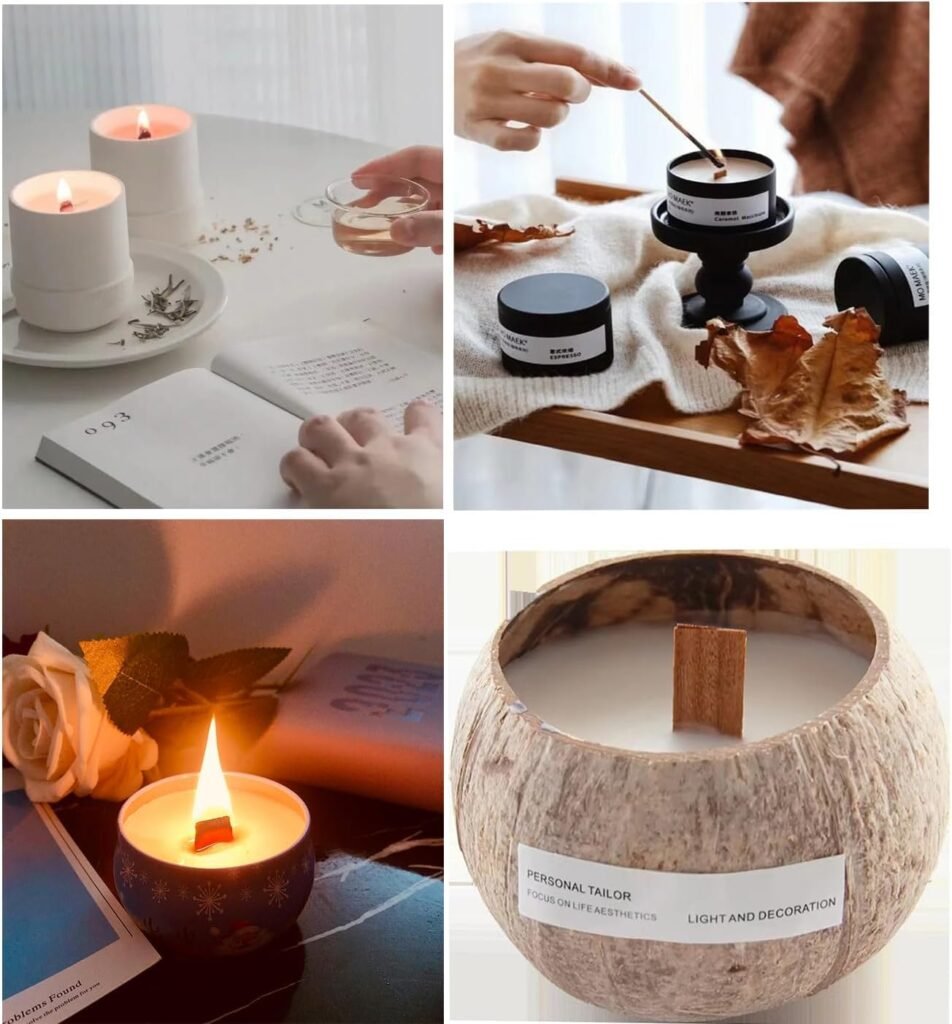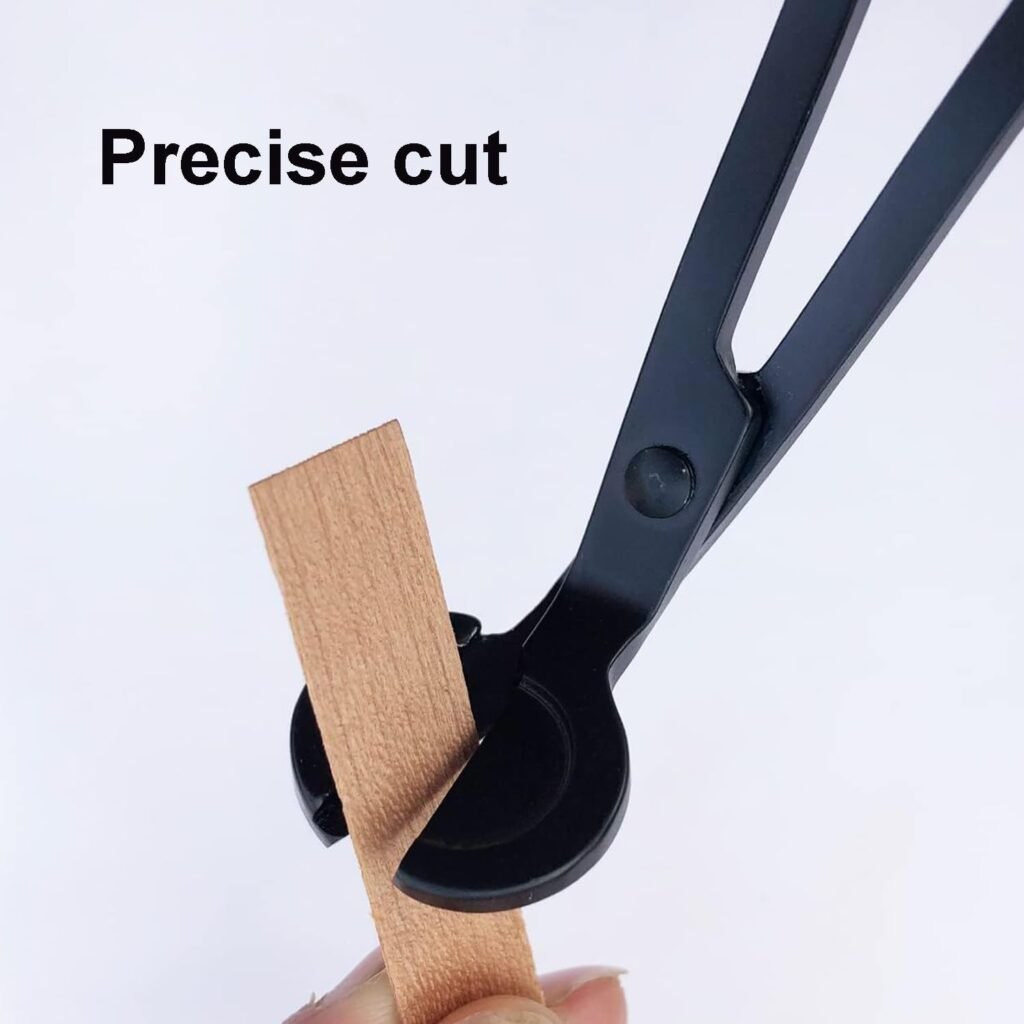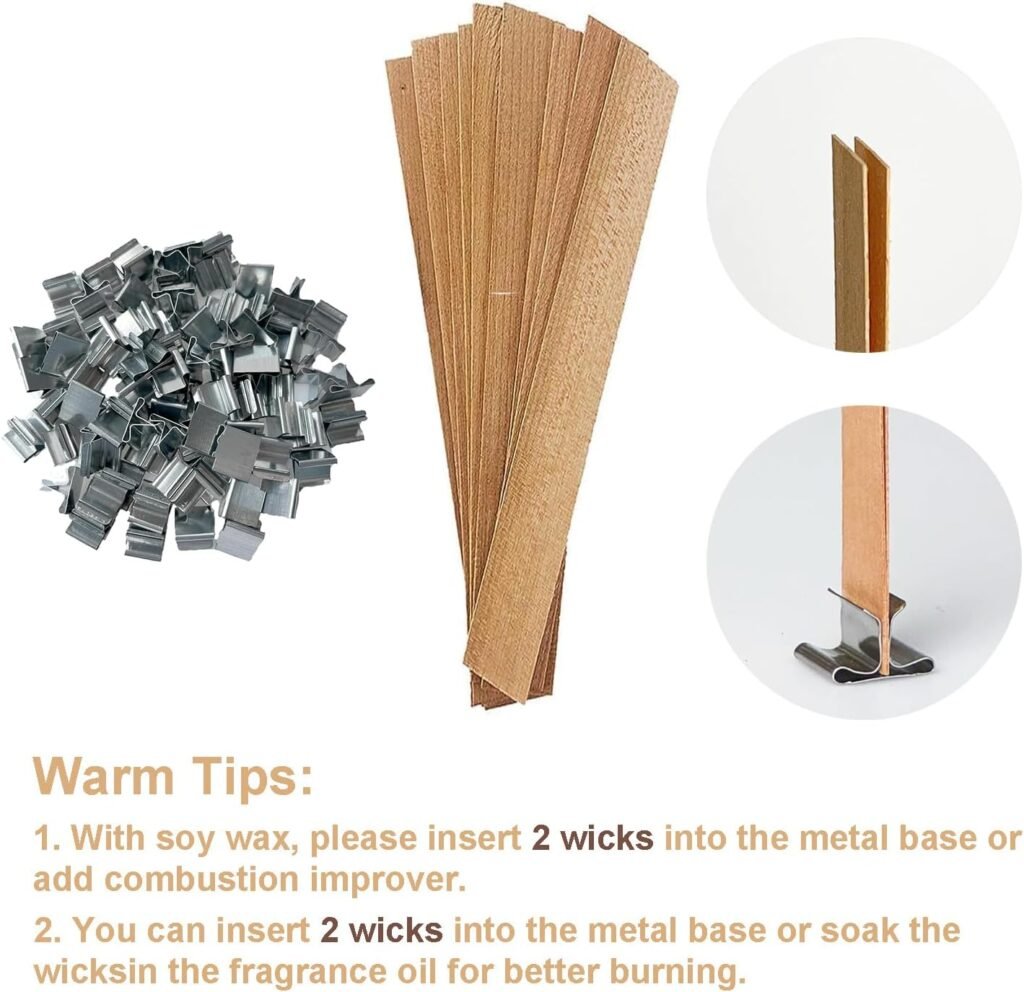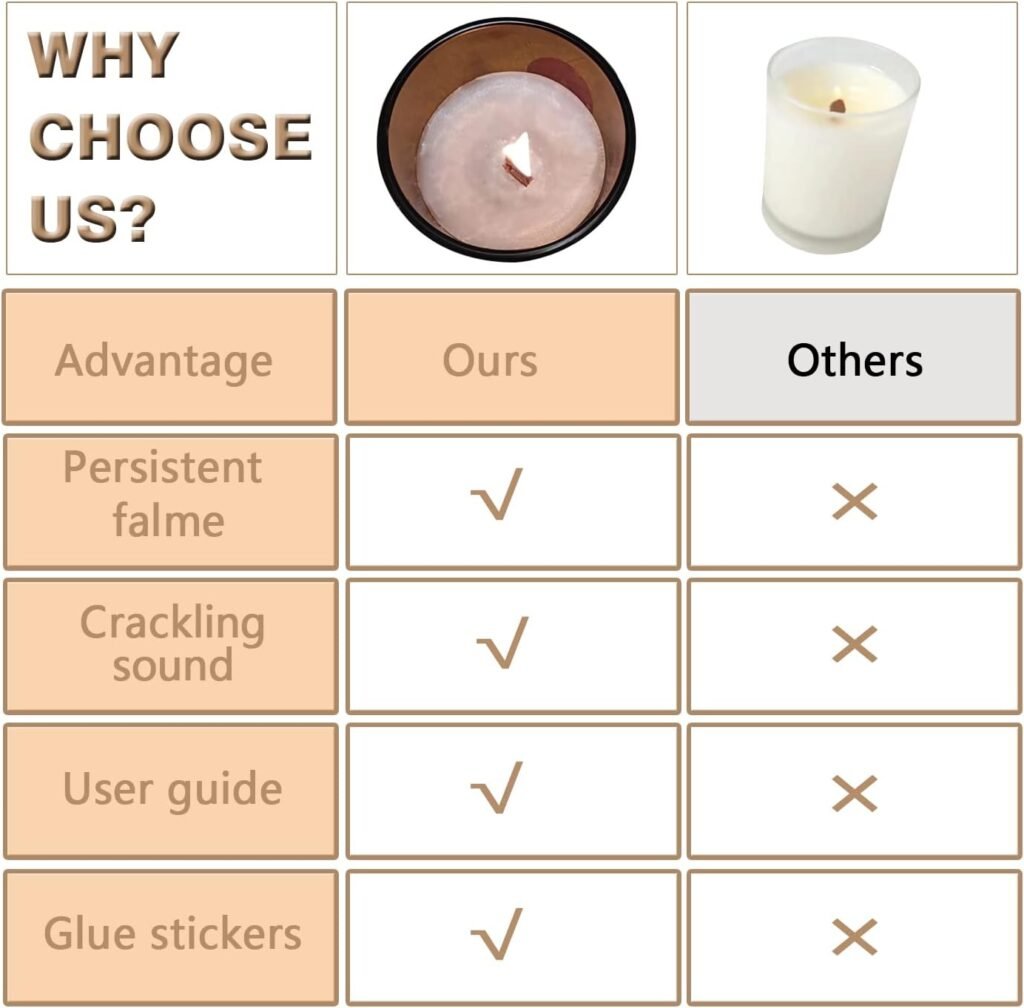?Are you thinking about making candles that look, smell, and sound special while giving you a warm, steady burn?
First Impressions
When you first handle the Wooden Candle Wicks with Wick Trimmer Cutter Crackling Candle Wicks kit 5.1 X 0.5 Inch Natural Candle Wood Wicks with Stand Candle Cores for DIY Candle Making Craft, you’ll notice solid construction and a thoughtfully assembled kit. The pieces feel sturdy and useful, and you’ll appreciate that the package includes tools you actually need rather than just wicks.
What’s Included
You get a generous set of components that will let you make many candles before needing to restock. Everything is organized to make your candle-making sessions efficient, from the wooden wicks themselves to the metal bases and the trimmer.
| Item | Quantity | Size / Notes |
|---|---|---|
| Wooden wicks (thick) | 50 pcs | 13 x 1.3 x 0.1 cm (5.1 x 0.5 x 0.04 in) |
| Metal bases (stands) | 50 pcs | For anchoring wicks at the container bottom |
| Wick stickers | 40 pcs | Double-sided adhesive pads for secure placement |
| Wick trimmer (matte black) | 1 pc | 7-inch stainless steel cutter |
| Total kit pieces | 141 pcs | Everything included in the product listing |
Product Specifications
You’ll want to know the practical specs before you commit to a project, and this kit lists the key details that matter. The wooden wicks are made from 100% natural wood, designed to burn clean and provide a crackling sound for atmosphere.
Wick Material and Build
The wooden wicks are produced from organic wood through natural processes, so you won’t be dealing with chemical-treated fibers. You’ll notice a firm, flat profile that helps stabilize the flame and promote a consistent melt pool when matched with the right wax and container size.
Trimmer and Accessories
The included 7-inch trimmer is made from stainless steel and finished in a matte black coating for a modern look. You’ll find the trimmer easy to use, and because it’s metal, it’s durable and resistant to rust—useful for trimming the wick after each burn.
Performance in Use
When you light a candle made with these wooden wicks, you’ll see a distinctive, wider flame compared with thin cotton wicks. The thicker wood helps produce a slower, steadier burn that can also give you that pleasant crackling sound you associate with wood-burning fires.
Ignition and Burn Behavior
Because these are thicker wooden wicks, you may find they are a bit harder to ignite than thinner wicks, and priming them can help with consistent ignition. Once established, the flame tends to burn slower than thin wicks, giving you a longer burn time and better wax usage when chosen appropriately.
Crackling and Ambiance
One of the main reasons you’ll opt for wooden wicks is the sound—the subtle crackle adds coziness and a sense of warmth to your candles. You’ll get a warm, romantic atmosphere that’s perfect for relaxing evenings or creating an inviting room tone without needing a fireplace.
Soot, Smoke, and Clean Burn
Because the wicks are chemical-free and non-toxic, you can expect a relatively clean burn when you use the proper wick size and follow good candle-making technique. You might see a small, soft smoke trail when extinguishing or if the wick is too long, but regular trimming and correct wick sizing minimize soot.
Suitable Wax Types and Containers
These wooden wicks work well with many wax types, including soy, coconut, and paraffin blends, but you’ll see the best performance when you match the wick thickness to the wax type and container diameter. You’ll want to test a few combinations to find the melt pool size and burn rate you prefer.
How to Prepare and Use the Wicks
Using these wicks effectively has a few steps, but once you get the hang of them you’ll find them quite user-friendly. Preparation involves priming, placement, and attention to the first burn so the wick forms a good memory for future use.
Soaking/Priming the Wicks
The product notes recommend soaking the thicker wicks in olive oil before use, which helps with ignition and ensures a more consistent burn. You’ll simply dip the wick in oil, let the excess drip off, and then set it in place—this small step can make lighting easier, especially with thicker wood wicks.
Attaching to Base and Positioning
You’ll attach the wooden wick to the metal base (or use a wick sticker) and press it firmly into the center of your container’s bottom. Positioning the wick precisely in the center helps create an even melt pool; you can stabilize the top of the wick with a wick holder or even a pencil while the wax sets.
First Burn and Memory Ring
On the first burn, you’ll want to allow the melt pool to reach the container edges—this helps the wax remember how to burn evenly in future sessions. You’ll keep a close eye during that initial burn to avoid tunnel formation, and you may find you get the best results after a couple of test burns.
Trimming and Long-term Maintenance
You should trim the wooden wick before extinguishing to about 3–5 mm above the wax for the cleanest burn and least smoke. The included stainless steel trimmer makes that job easy; you’ll clip away char after each burn so the wick lights reliably the next time.
Safety Tips
You’ll need to follow basic candle safety precautions with wooden wicks just as you would with cotton ones. Keep candles away from drafts, pets, and children, place them on heatproof surfaces, and never leave a burning candle unattended.
Pros and Cons
You’ll find that this kit offers many advantages, but there are some trade-offs you should be aware of before buying. The mix of quality components and accessories gives strong value, while thicker wicks require slightly different handling and testing than thin cotton wicks.
Pros
The kit contains enough components to make dozens of candles, and you’ll appreciate the clean, natural burning characteristics of the wood. The included trimmer is durable and attractive, and the metal bases and stickers make setup fast and secure for each candle.
Cons
Because these wicks are on the thicker side, you may have to prime them and test wax-wick combinations to get perfect results. If you’re looking for an ultra-easy, plug-and-play experience for all wax types, you might prefer thinner wicks or pre-tabbed versions tailored to specific waxes.
Comparison with Other Wick Types
If you’re used to cotton or hemp wicks, wooden wicks will behave differently and offer different benefits. You’ll find wooden wicks give a broader, steadier flame and a unique sound, but they do require a bit more initial testing to match to your wax and container.
Wooden vs Cotton Wicks
Compared with cotton wicks, wooden wicks generally produce less soot and a more decorative flame but can be harder to light. You’ll also enjoy the sensory element that wooden wicks add, especially if the crackling sound is something you value in a candle.
Thick vs Thin Wooden Wicks
This kit offers thicker wooden wicks, which burn slower and produce a larger flame than thinner wooden alternatives. You’ll need to account for the thicker profile by priming or testing, but the payoff is longer burn times and a richer ambiance.
Who This Kit Is Best For
You’ll benefit most from this kit if you’re making container candles for gifts, home decor, or small-scale sales and you want a natural, crackling flame. It’s especially useful if you enjoy the DIY aspect and are happy to run some tests to find the perfect wick/wax/container combination.
Packaging and Value
Given the included 141 items, the kit represents strong value if you plan to make multiple candles or teach a friend to make candles with you. You’ll get tools you actually use—like the base pins and the trimmer—so you won’t need to buy extras right away.
Troubleshooting Common Issues
When you make candles, especially with wooden wicks, you’ll sometimes run into issues that are easy to fix with small adjustments. Troubleshooting typically involves trimming, priming, or changing the wick size relative to the container.
Wick Won’t Stay Lit
If the wick struggles to stay lit, try priming it with olive oil before pouring or swapping to a slightly thicker wick if you have a larger container. You’ll also check for drafts and ensure the wax surface is free of debris that could affect the flame.
Tunneling or Poor Melt Pool
If your candles tunnel or don’t form a full melt pool, you’ll want to burn them longer on the first use until the wax reaches the edges. You might also test a different wick size or reposition the wick to ensure it’s centered and getting the heat it needs.
Excess Smoke or Soot
If you see more smoke or soot than desired, trim the charred portion of the wick to a shorter length before relighting. You’ll also avoid drafts and use the included trimmer to consistently remove excess char, which reduces smoke.
Frequently Asked Questions (FAQ)
You probably have specific questions if you’re considering this kit, and these answers will help you decide whether it’s a fit for your projects. Here are some of the most common concerns and practical tips to get better results.
Can I use these wicks with soy wax?
Yes—you can use the wooden wicks with soy wax, but you’ll likely need to test to find the best wick-to-container ratio. You’ll want to run a couple of sample burns, since soy wax can require a different wick size than paraffin to form a proper melt pool.
Do I really need to soak the wicks in olive oil?
Soaking in olive oil is recommended for these thicker wood wicks to improve ignition and burn stability, especially on the first couple of burns. You’ll dip the wick for a short time, blot the excess, and then set it in place to help with reliable lighting.
How long should I trim the wick?
Trim the wick to roughly 3–5 mm (about 1/8 to 3/16 inch) before each burn to maintain a stable flame with minimal smoke. You’ll use the included 7-inch trimmer to clip charred wood conveniently and safely.
Can the crackling damage the container?
The crackling sound is just the wood heating and releasing gases; it shouldn’t damage a standard candle container if the wick is sized correctly. You’ll avoid placing glass containers near temperature-sensitive surfaces and always keep an eye on the first burn to ensure safe performance.
How many candles can I make with this kit?
With 50 wooden wicks, 50 metal bases, and 40 stickers, you can make up to 50 candles using the provided bases, or between 40–50 if you rely on stickers instead. You’ll get a lot of crafting sessions out of this kit, and the extras give you room for mistakes or experimentation.
Is the trimmer suitable for long-term use?
Yes—the 7-inch stainless steel trimmer has a matte black finish and is built to be durable and rust-resistant. You’ll likely use it for many candle sessions and keep it as your regular candle-care tool.
Candle-Making Tips for Best Results
If you want to get consistently good results with these wicks, follow a few practical tips that experienced makers use. You’ll save time, avoid common mistakes, and create candles that burn cleanly and smell great.
Test Small Batches First
Make small test candles before committing an entire batch to a single wick size, so you’ll find the best heat output and melt pool size for your wax and container. You’ll run a few tests at different wick heights and positions to determine the optimal configuration.
Use Correct Pour Temperatures
Pouring wax at recommended temperatures for your wax type helps the wick adhere properly and the wax cure uniformly. You’ll follow manufacturer guidelines for each wax to prevent adhesion or sinkage issues.
Keep Container Size in Mind
A larger container generally needs a larger wick or multiple wicks for an even melt pool. You’ll avoid single-wick setups in wide containers where the wax cannot reach the edges, or you’ll place more than one wooden wick evenly spaced.
Storage and Shelf Life
You’ll want to store unused wooden wicks and metal bases in a cool, dry place away from direct sunlight to preserve their quality. Proper storage will keep the wood from warping and maintain the adhesives’ effectiveness.
Environmental Considerations
The wicks are made from natural wood and are marketed as chemical-free, which is appealing if you prefer more natural candle components. You’ll still want to practice safe disposal of used wicks and containers, particularly if you used scented or dyed waxes.
Aesthetic and Scent Considerations
Wooden wicks provide a distinctive visual and audio signature and generally pair well with subtle, natural fragrance levels. You’ll find that a heavy fragrance load can affect the burn, so calibrate scent percentages during your test burns to maintain clean combustion.
Final Thoughts on Functionality
Overall, you’ll find the Wooden Candle Wicks with Wick Trimmer Cutter Crackling Candle Wicks kit 5.1 X 0.5 Inch Natural Candle Wood Wicks with Stand Candle Cores for DIY Candle Making Craft to be a practical and satisfying kit if you’re ready to put in a small amount of trial-and-error work. The tools and components make it a good value, and the finished candles deliver that cozy crackle and attractive flame you’re likely aiming for.
Overall Recommendation
If you want to make candles that stand out visually and audibly, and you enjoy testing to find the ideal wick/wax/container pairing, this kit will serve you well. You’ll benefit from the comprehensive components, durable trimmer, and the natural look and sound that wooden wicks bring to your projects.
Disclosure: As an Amazon Associate, I earn from qualifying purchases.
